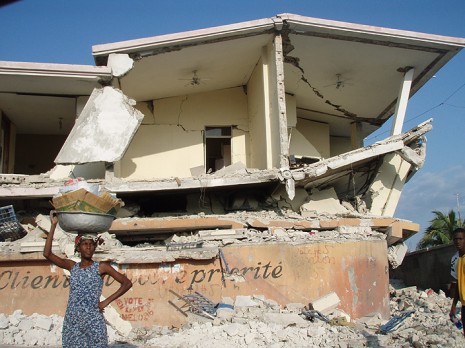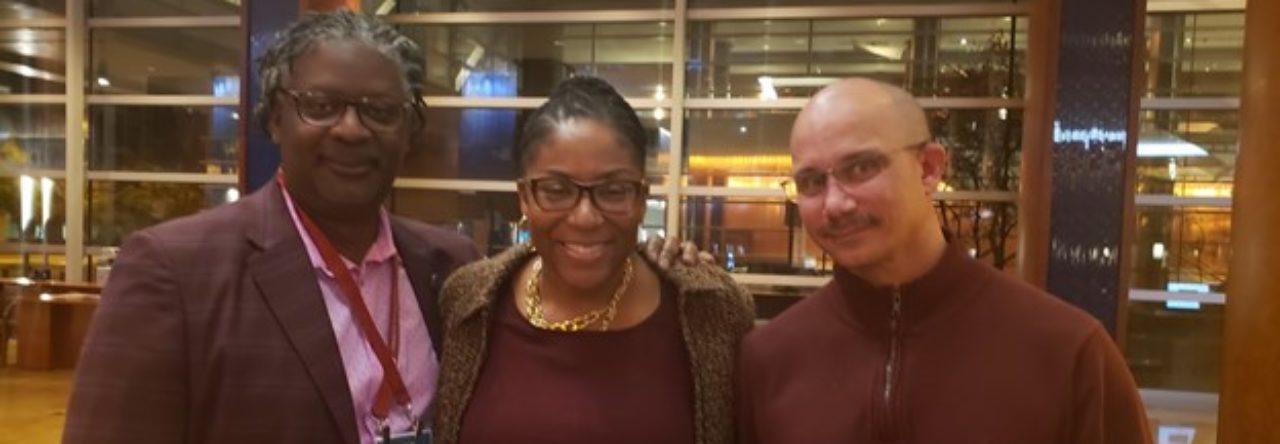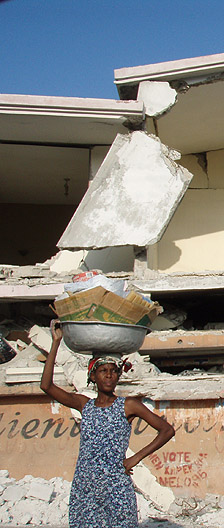It has been four years since a 7.0 earthquake devastated parts of Haiti. At present, this disaster claimed over 200,000 lives and has left over 150,000. Additionally, Haitians continue to suffer from a cholera outbreak that has claimed thousands of lives.
 Haitian woman carrying supplies amid the destruction from the January 2010 Haiti earthquake. (U.S. Geological Survey/photo by Anthony Crone.)
Haitian woman carrying supplies amid the destruction from the January 2010 Haiti earthquake. (U.S. Geological Survey/photo by Anthony Crone.)
In 2014, the Association of Black Anthropologists (ABA) continues to focus on Haiti by standing in support and solidarity with Haiti, the first black republic in the world, by disseminating Haiti-related information and providing anthropological analysis of recent news from Haiti and issues affecting the Haitian diaspora.
To facilitate an informed dialogue about the past, present and future of Haiti, we ask that peers and colleagues continue to submit relevant Haiti-related information to the ABA focus on Haiti website to Bertin M. Louis, Jr. at: abahaiti@gmail.com. Please send:
- Articles and Essays by anthropologists about Haiti and Haitian Earthquake Recovery-related topics,
- Links of anthropologists in the media discussing Haiti and Haitian Earthquake Recovery-related topics,
- Websites about Haiti, Haitian Culture and History, and
- Annotated bibliographic information.
- Michel-Rolph Trouillot (1949-2012)
- American Anthropological Association: Remembering Michel-Rolph Trouillot
- Remembering Trouillot (Colin Dayan)
- Anthropology Report: Michel-Rolph Trouillot, Bibliography
- Cholera and Earthquake Relief (courtesy of potomitan.net)
- Partners in Health
- Digital Library of the Caribbean’s Protecting Haitian Patrimony Initiative
- Dwa Fanm
- Fonkoze
- FANM
- Haiti Reborn
- Lambifund
- Madre
- Recent Books about Haiti and Haitians
- Mark Schuller. 2012. Killing with Kindness: Haiti, International Aid, and NGOs
- Books about the Haiti Earthquake by Anthropologists
- Haiti After The Earthquake by Paul Farmer
- Tectonic Shifts: Haiti Since the Earthquake. Edited by Mark Schuller and Pablo Morales
-
Anthropologists Discussing Haiti in the Media: Recent Commentary (as of January 24, 2014)
- Pooja Bhatia
- Help for Haiti (Douze Janvyè [January 12])
- Jacob Kushner
- Four years after the Haiti earthquake, what have billions in U.S. aid bought?
- Bertin M. Louis, Jr.
- #ShamelesslyHaitian on Haiti’s Independence Day (Also available in French here)
- Greg Beckett
- Moving Beyond Disaster to Build a Durable Future in Haiti
- Is the United States Doing Enough for Haiti?
- Elizabeth Chin
- Anthropology Now Haiti Watch
- Why Adopting Haitian Children is a Terrible Idea
- Alex Dupuy
- Foreign Help Actually Hurting Haiti
- Paul Farmer
- How to Stop Cholera in Haiti
- Haitian Government Needs More Aid NECN.com
- PBS News Hour
- The New York Times
- Jeffrey Kahn
- Cut the Red Tape: Why Haitians Need Humanitarian Parole Now
- Helping Haiti Help Itself
- Relax the Caps for Haitian Visa Applicants
- Jim Yong Kim
- Dartmouth’s President, a Global Health Leader, Offers Perspectives on Helping Haiti Chronicle of Higher Education
- Jonna Knappenberger
- Cholera Cases and Questions in the North
- Violence in Cap Haitien update
- Milot’s Forgotten “Tent City”
- Bertin M. Louis, Jr.
- Studying Voodoo isn’t a Judgement USA Today article referencing essays.
- Haiti’s Pact with the Devil? Some Haitians Believe This Too
- The Hubert Smith Radio Show
- WATE-6 News (Knoxville, TN)
- Tennessee This Week (Knoxville, TN)
- The Hubert Smith Radio Show/Haiti: One Year After the Earthquake
- Elizabeth McAlister
- Voodoo’s View of the Quake in Haiti
- Devil’s Logic: Behind Pat Robertson’s Blame Game
- Haiti’s Musical Traditions, Past and Present
- Elizabeth McAlister on Hope and Tragedy
- Voodoo Brings Solace to Haitians
- Why Does Haiti Suffer So Much?
- Sidney Mintz
- Whitewashing Haiti’s History
- Jemima Pierre
- Bill Clinton Loves Haiti
- The Dominican Republic Hates Black People
- Don’t Blame Repbulicans for Obama’s Actions in Haiti
- How to Help Haiti
- Our Failure On Haiti
- The Politics of Rebuilding Haiti CounterSpin interview
- The Puppet, the Dictator, and the President: Haiti Today and Tomorrow
- Karen Richman
- Mass Graves May Have Lasting Spiritual Impact in Haiti
- Run From the Earthquake, Fall Into The Abyss: A Léogane Paradox
- Nina Glick Schiller and Georges Fouron
- Killing Me Softly: Violence, Globalization, and the Apparent State
- Bill Quigley and Amber Ramanauskas
- Where the Relief Money Did and Did Not Go: Haiti After the Quake
- Mark Schuller
- “Chaos and Cholera: Haiti’s Message to the Tea Party (and the Rest of Us)”
- Clearing the Rubble, Including the Old Plan for Haiti
- Did you Drink Soup? Strains on Solidarity in Haiti
- Falling Through the Cracks, Or Unstable Foundations?
- Fault Lines: Haiti’s Earthquake and Reconstruction, Through the Eyes of Many
- Haiti One Year Later
- Haiti’s Resurrection: Promoting Human Rights
- Haiti’s Second Goudougoudou: The Global Food Crisis
- Haiti’s Unnatural Disasters
- Interview with Mark Schuller on Democracy Now!
- Passing The Riot Test
- Rained Out? Opportunities in Haiti Washing Away
- Sowing Seeds of Hope or Seeds of Dependence?
- Starfish and Seawalls: Responding to Haiti’s Earthquake, Now and Long-Term Commondreams.org
- Tectonic Shifts? The upcoming donors conference for Haiti
- “Too Soon for the Carnival des Fleurs: Sweeping Haiti’s Poor Back under the Rug”
- Uncertain Ground
- Unstable Foundations: Human Rights of Haiti’s 1.5 Million IDPs
- What Wyclef Lays Bare for Monday’s Foreign Policy Debate
- Gina Athena Ulysse
- Amid Rubble And Ruin, Our Duty To Haiti Remains National Public Radio
- Defending Vodou in Haiti
- Goudougoudou: Earthquake Memories from Haiti
- Haiti’s Earthquake’s Name and Some Women’s Trauma
- Haiti’s Electionaval
- Haiti’s Fouled-up Elections
- Haiti’s Future: A Requiem for the Dying
- Haiti’s Future: Repeating Disasters
- Haiti’s Solidarity with Angels
- Haitian Feminist Yolette Jeanty Honored With Other Global Women’s Activists
- The Haiti Story You Won’t Read
- Haiti’s Vodou Religion Ulysse and Sibylle Fischer discuss how Vodou (please note spelling) has been demonized to become “voodoo”
- Haiti Will Never Be The Same Ulysse discusses Haiti’s past and why it must set a different course in the future
- The Legacy of Haitian FeministPaulette Poujol-Oriol
- New Narratives for Haiti MP3; an interview on Feminist Magazine on KPFK
- Rape a Part of Daily Life for Haitian Women in Relief Camps
- The Way We See Haiti Here on Earth
- Why Context Matters: Journalists and Haiti
- Why I am Marching for “Ayiti Cherie” (Beloved Haiti)
- Why Representations of Haiti Matter Now more than Ever
- Landon Yarrington
- More Updates from Cap Haitien
- Updates from Cap Haitien
- Violence in Cap Haitien
- A Day at the Beach
- Port-au-Prince or Port-au-President?
- Can Wyclef Tap Haiti’s Youth Movement?
- How Haiti Can Reclaim Sovereignty
- The Logic of Triage in Humanitarian Action
- Anthropologists Discussing Post-Earthquake Haiti in the Media (Alphabetical Order)
- Haiti Facts and History
- Haiti Lives: Contributions of Haitian Anthropologist Antenor Firmin by Deneia Fairweather
- C.I.A. World Factbook – Haiti
- Bob Corbett’s Haitian History Page
- Haiti and the U.S.A.: Neighbors Linked by History and Community. The Trinity College Haiti Program.
- Annotated Haiti Bibliography
- Farmer, Paul. 1994.The Uses of Haiti. Monroe: Common Courage Press.
- The Uses of Haiti uses the quest for human dignity of the majority of Haitian society (the Haitian poor) as a critical lens to analyze Haitian history. By reviewing the actions of nations such as France and the United States and particular actors in Haitian history such as Toussaint Louverture, the Haitian upper class, the Haitian military, François and Jean-Claude Duvalier, Farmer’s goal is to reveal the structural issues (structural adjustment programs, an indemnity the Boyer administration paid France in the 19th century so that France would not invade Haiti and the Duvalier kleptocracy) to provide answers as to why poverty and underdevelopment are persistent in Haiti. (Visit Amazon’s Paul Farmer page.)
- Glick Schiller, Nina and Georges Fouron. 2001. Georges Woke Up Laughing: Long-Distance Nationalism and the Search for Home. Durham: Duke University Press.
- Georges Woke Up Laughing is a superb ethnography which uses research in the United States and research in Haiti to demonstrate the continued ties between Haitians living in the United States and Haiti. Using the experiences and family history of Dr. Georges Fouron, a professor of education and Africana Studies at Stony Brook University who is of Haitian descent, the text takes readers from the United States to Haiti to analyze the current crisis in Haiti, gender, nationalism and the relationship between later generations of Haitian Americans and Haiti. (View more on Amazon.)
- Pamphile, Leon. 2001. Haitians and African Americans: A Heritage of Tragedy and Hope. Gainesville: University of Florida Press.
- Haitians and African Americansis an informative text which demonstrates the long historical relationship between Haitians and African Americans. This book deals with the shared heritage of slavery for both groups and how the paths of African Americans and Haitians have crossed repeatedly in their dual quest for freedom from human bondage and equality. For example, this book recognizes some of important contributions that Haitians made to American society by Haitians like the founding of Chicago by a Haitian named Jean Baptiste Point du Sable. In addition, the text notes the African American political support of Haiti and Haitians especially during the Haitian boat crisis of the late 20th century. (View more on Amazon.)
- Zéphir, Flore. 2004. The Haitian Americans. Westport: Greenwood Press.
- The Haitian Americans is an excellent resource about the Haitian presence in the United States. The author provides a detailed history of Haiti, a history of Haitians in the United States, statistics about Haitian migration to the United States, information about established and growing Haitian communities across the United States and short biographies about prominent Haitian Americans who contribute to the fabric of American society. (View more on Amazon.)

